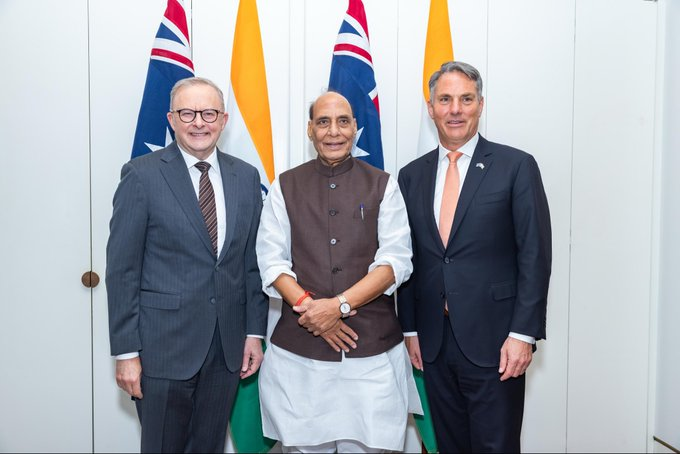
CANBERRA – India and Australia signed several important defense agreements during Defense Minister Rajnath Singh’s visit to Australia. The agreements were signed in the presence of Defense Minister Rajnath Singh and Australia’s Deputy Prime Minister and Defense Minister Richard Marles. Rajnath Singh and Richard Marles held a meeting with senior defense officials at the Parliament House in Canberra. Both leaders appreciated the rapidly progressing cooperation in India-Australia defense relations and described the talks as useful, forward-looking, and enhancing strategic coordination.
Strengthening Both Countries’ Armed Forces
Later, Australia’s Prime Minister Anthony Albanese also joined the meeting. Richard Marles described this new defense agreement with India as a very important step towards strengthening operational partnership between the armed forces of both countries. He said, ‘Today is significant because the deep trust and strategic alignment between India and Australia is now visible at the operational level of our armed forces. The agreement we have made for staff talks between our operational commands is very important… We are very excited about this.

What did Rajnath Singh say about the defense agreement?
Rajnath Singh wrote, I had a very productive meeting with Australia’s Deputy Prime Minister and Defense Minister Richard Marles. We reviewed the entire scope of India-Australia defense cooperation, including defense industry, cybersecurity, maritime security, and issues related to regional challenges. During the meeting, both countries reiterated the importance of their comprehensive strategic partnership. Rajnath Singh said, I highlighted the rapid progress of India’s defense industry and its growing role as a reliable source of high-quality defense technology. We also discussed possibilities to further deepen defense industry partnership between India and Australia. I expressed gratitude for Australia’s firm support on cross-border terrorism and regional stability. We agreed that both countries will work together to strengthen their cooperation for a free, open, and empowered Indo-Pacific region.






